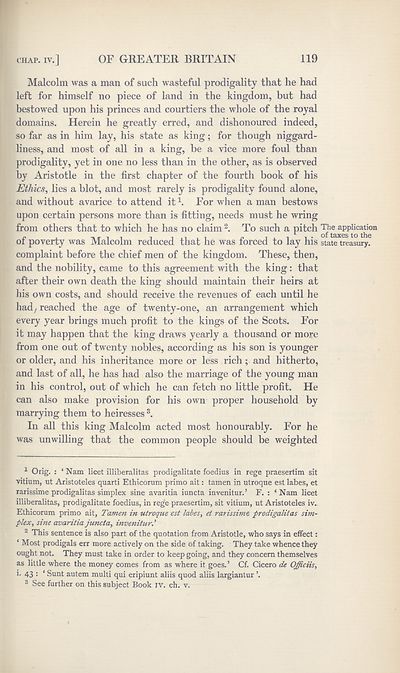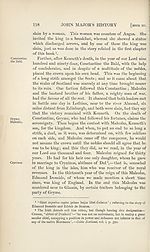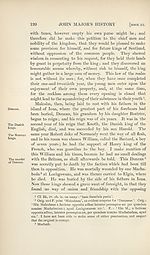Series 1 > History of Greater Britain, as well England as Scotland
(264) Page 119
Download files
Complete book:
Individual page:
Thumbnail gallery: Grid view | List view

CHAP. IV.]
OF GREATER BRITAIN
119
Malcolm was a man of such wasteful prodigality that he had
left for himself no piece of land in the kingdom, but had
bestowed upon his princes and courtiers the whole of the royal
domains. Herein he greatly erred, and dishonoured indeed,
so far as in him lay, his state as king; for though niggard¬
liness, and most of all in a king, be a vice more foul than
prodigality, yet in one no less than in the other, as is observed
by Aristotle in the first chapter of the fourth book of his
Ethics, lies a blot, and most rarely is prodigality found alone,
and without avarice to attend itx. For when a man bestows
upon certain persons more than is fitting, needs must he wring
from others that to which he has no claim 2. To such a pitch ^application
of poverty was Malcolm reduced that he was forced to lay his state treasury,
complaint before the chief men of the kingdom. These, then,
and the nobility, came to this agreement with the king: that
after their own death the king should maintain their heirs at
his own costs, and should receive the revenues of each until he
had, reached the age of twenty-one, an arrangement which
every year brings much profit to the kings of the Scots. For
it may happen that the king draws yearly a thousand or more
from one out of twenty nobles, according as his son is younger
or older, and his inheritance more or less rich; and hitherto,
and last of all, he has had also the marriage of the young man
in his control, out of which he can fetch no little profit. He
can also make provision for his own proper household by
marrying them to heiresses 2
In all this king Malcolm acted most honourably. For he
was unwilling that the common people should be weighted
1 Orig. : ‘ Nam licet illiberalitas prodigalitate foedius in rege praesertim sit
vitium, ut Aristoteles quarti Ethicorum prime ait: tamen in utroque est labes, et
rarissime prodigalitas simplex sine avaritia iuncta invenitur.’ F. : ‘Nam licet
illiberalitas, prodigalitate foedius, in reg'e praesertim, sit vitium, ut Aristoteles iv.
Ethicorum prime ait, Tamen in utroque est labes, et rarissime prodigalitas sim¬
plex, sine avaritia juncta, invenitur.'
2 This sentence is also part of the quotation from Aristotle, who says in effect:
‘ Most prodigals err more actively on the side of taking. They take whence they
ought not. They must take in order to keep going, and they concern themselves
as little where the money comes from as where it goes.’ Cf. Cicero de Officiis,
i. 43 : ‘ Sunt autem multi qui eripiunt aliis quod aliis largiantur ’.
3 See further on this subject Book iv. ch. v.
OF GREATER BRITAIN
119
Malcolm was a man of such wasteful prodigality that he had
left for himself no piece of land in the kingdom, but had
bestowed upon his princes and courtiers the whole of the royal
domains. Herein he greatly erred, and dishonoured indeed,
so far as in him lay, his state as king; for though niggard¬
liness, and most of all in a king, be a vice more foul than
prodigality, yet in one no less than in the other, as is observed
by Aristotle in the first chapter of the fourth book of his
Ethics, lies a blot, and most rarely is prodigality found alone,
and without avarice to attend itx. For when a man bestows
upon certain persons more than is fitting, needs must he wring
from others that to which he has no claim 2. To such a pitch ^application
of poverty was Malcolm reduced that he was forced to lay his state treasury,
complaint before the chief men of the kingdom. These, then,
and the nobility, came to this agreement with the king: that
after their own death the king should maintain their heirs at
his own costs, and should receive the revenues of each until he
had, reached the age of twenty-one, an arrangement which
every year brings much profit to the kings of the Scots. For
it may happen that the king draws yearly a thousand or more
from one out of twenty nobles, according as his son is younger
or older, and his inheritance more or less rich; and hitherto,
and last of all, he has had also the marriage of the young man
in his control, out of which he can fetch no little profit. He
can also make provision for his own proper household by
marrying them to heiresses 2
In all this king Malcolm acted most honourably. For he
was unwilling that the common people should be weighted
1 Orig. : ‘ Nam licet illiberalitas prodigalitate foedius in rege praesertim sit
vitium, ut Aristoteles quarti Ethicorum prime ait: tamen in utroque est labes, et
rarissime prodigalitas simplex sine avaritia iuncta invenitur.’ F. : ‘Nam licet
illiberalitas, prodigalitate foedius, in reg'e praesertim, sit vitium, ut Aristoteles iv.
Ethicorum prime ait, Tamen in utroque est labes, et rarissime prodigalitas sim¬
plex, sine avaritia juncta, invenitur.'
2 This sentence is also part of the quotation from Aristotle, who says in effect:
‘ Most prodigals err more actively on the side of taking. They take whence they
ought not. They must take in order to keep going, and they concern themselves
as little where the money comes from as where it goes.’ Cf. Cicero de Officiis,
i. 43 : ‘ Sunt autem multi qui eripiunt aliis quod aliis largiantur ’.
3 See further on this subject Book iv. ch. v.
Set display mode to:
![]() Universal Viewer |
Universal Viewer | ![]() Mirador |
Large image | Transcription
Mirador |
Large image | Transcription
Images and transcriptions on this page, including medium image downloads, may be used under the Creative Commons Attribution 4.0 International Licence unless otherwise stated. ![]()
| Scottish History Society volumes > Series 1 > History of Greater Britain, as well England as Scotland > (264) Page 119 |
|---|
| Permanent URL | https://digital.nls.uk/127734933 |
|---|
| Attribution and copyright: |
|
|---|
| Description | Over 180 volumes, published by the Scottish History Society, containing original sources on Scotland's history and people. With a wide range of subjects, the books collectively cover all periods from the 12th to 20th centuries, and reflect changing trends in Scottish history. Sources are accompanied by scholarly interpretation, references and bibliographies. Volumes are usually published annually, and more digitised volumes will be added as they become available. |
|---|


